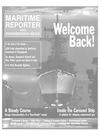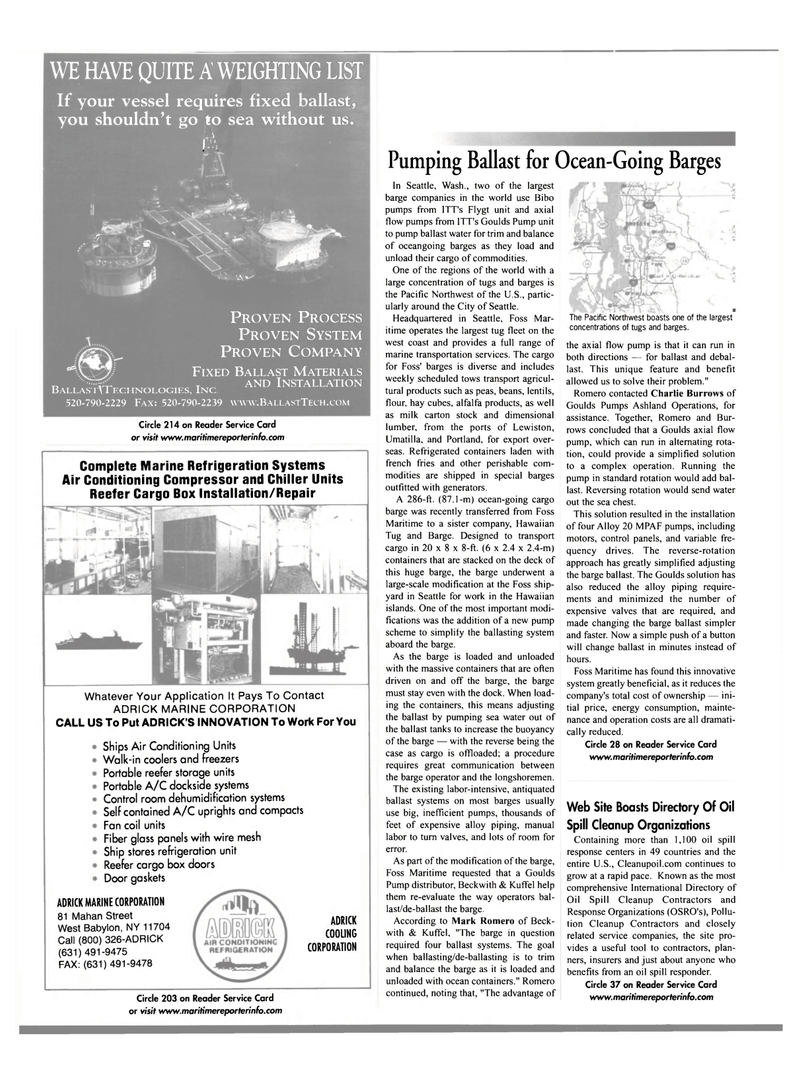
Page 62: of Maritime Reporter Magazine (October 2001)
Read this page in Pdf, Flash or Html5 edition of October 2001 Maritime Reporter Magazine
WE HAVE QUITE A WEIGHTING LIST
If your vessel requires fixed ballast, you shouldn't go to sea without us* 2,-1
I A
PROVEN PROCESS
PROVEN SYSTEM
PROVEN COMPANY
FIXED BALLAST MATERIALS
T AND INSTALLATION BALLAST\TECHNOLOGIES, INC.
520-790-2229 FAX: 520-790-2239 WWW.BALLASTTECH.COM
Pumping Ballast for Ocean-Going Barges
Circle 214 on Reader Service Card
or visit www.maritimereporterinfo.com
Complete Marine Refrigeration Systems
Air Conditioning Compressor and Chiller Units
Reefer Cargo Box Installation/Repair
Whatever Your Application It Pays To Contact
ADRICK MARINE CORPORATION
CALL US To Put ADRICK'S INNOVATION To Work For You
Ships Air Conditioning Units
Walk-in coolers and freezers
Portable reefer storage units
Portable A/C dockside systems
Control room dehumidification systems
Self contained A/C uprights and compacts
Fan coil units
Fiber glass panels with wire mesh
Ship stores refrigeration unit
Reefer cargo box doors
Door gaskets
ADRICK MARINE CORPORATION
81 Mahan Street
West Babylon, NY 11704
Call (800) 326-ADRICK
(631) 491-9475
FAX: (631) 491-9478
ADRICK
COOUNG
CORPORATION
Circle 203 on Reader Service Card
or visit www.maritimereporterinfo.com
In Seattle, Wash., two of the largest
barge companies in the world use Bibo
pumps from ITT's Flygt unit and axial
flow pumps from ITT's Goulds Pump unit
to pump ballast water for trim and balance
of oceangoing barges as they load and
unload their cargo of commodities.
One of the regions of the world with a
large concentration of tugs and barges is
the Pacific Northwest of the U.S., partic-
ularly around the City of Seattle.
Headquartered in Seattle, Foss Mar-
itime operates the largest tug fleet on the
west coast and provides a full range of
marine transportation services. The cargo
for Foss' barges is diverse and includes
weekly scheduled tows transport agricul-
tural products such as peas, beans, lentils,
flour, hay cubes, alfalfa products, as well
as milk carton stock and dimensional
lumber, from the ports of Lewiston,
Umatilla, and Portland, for export over-
seas. Refrigerated containers laden with
french fries and other perishable com-
modities are shipped in special barges
outfitted with generators.
A 286-ft. (87.1-m) ocean-going cargo
barge was recently transferred from Foss
Maritime to a sister company, Hawaiian
Tug and Barge. Designed to transport
cargo in 20 x 8 x 8-ft. (6 x 2.4 x 2.4-m)
containers that are stacked on the deck of
this huge barge, the barge underwent a
large-scale modification at the Foss ship-
yard in Seattle for work in the Hawaiian
islands. One of the most important modi-
fications was the addition of a new pump
scheme to simplify the ballasting system
aboard the barge.
As the barge is loaded and unloaded
with the massive containers that are often
driven on and off the barge, the barge
must stay even with the dock. When load-
ing the containers, this means adjusting
the ballast by pumping sea water out of
the ballast tanks to increase the buoyancy
of the barge — with the reverse being the
case as cargo is offloaded; a procedure
requires great communication between
the barge operator and the longshoremen.
The existing labor-intensive, antiquated
ballast systems on most barges usually
use big, inefficient pumps, thousands of
feet of expensive alloy piping, manual
labor to turn valves, and lots of room for
error.
As part of the modification of the barge,
Foss Maritime requested that a Goulds
Pump distributor, Beckwith & Kufifel help
them re-evaluate the way operators bal-
last/de-ballast the barge.
According to Mark Romero of Beck-
with & Kuffel, "The barge in question
required four ballast systems. The goal
when ballasting/de-ballasting is to trim
and balance the barge as it is loaded and
unloaded with ocean containers." Romero
continued, noting that, "The advantage of
the axial flow pump is that it can run in
both directions — for ballast and debal-
last. This unique feature and benefit
allowed us to solve their problem."
Romero contacted Charlie Burrows of
Goulds Pumps Ashland Operations, for
assistance. Together, Romero and Bur-
rows concluded that a Goulds axial flow
pump, which can run in alternating rota-
tion, could provide a simplified solution
to a complex operation. Running the
pump in standard rotation would add bal-
last. Reversing rotation would send water
out the sea chest.
This solution resulted in the installation
of four Alloy 20 MPAF pumps, including
motors, control panels, and variable fre-
quency drives. The reverse-rotation
approach has greatly simplified adjusting
the barge ballast. The Goulds solution has
also reduced the alloy piping require-
ments and minimized the number of
expensive valves that are required, and
made changing the barge ballast simpler
and faster. Now a simple push of a button
will change ballast in minutes instead of
hours.
Foss Maritime has found this innovative
system greatly beneficial, as it reduces the
company's total cost of ownership — ini-
tial price, energy consumption, mainte-
nance and operation costs are all dramati-
cally reduced.
Circle 28 on Reader Service Card
www.maritimereporterinfo.com
Web Site Boasts Directory Of Oil
Spill Cleanup Organizations
Containing more than 1,100 oil spill
response centers in 49 countries and the
entire U.S., Cleanupoil.com continues to
grow at a rapid pace. Known as the most
comprehensive International Directory of
Oil Spill Cleanup Contractors and
Response Organizations (OSRO's), Pollu-
tion Cleanup Contractors and closely
related service companies, the site pro-
vides a useful tool to contractors, plan-
ners, insurers and just about anyone who
benefits from an oil spill responder.
Circle 37 on Reader Service Card
www.maritimereporterinfo.com
X
The Pacific Northwest boasts one of the largest
concentrations of tugs and barges.

 61
61

 63
63
